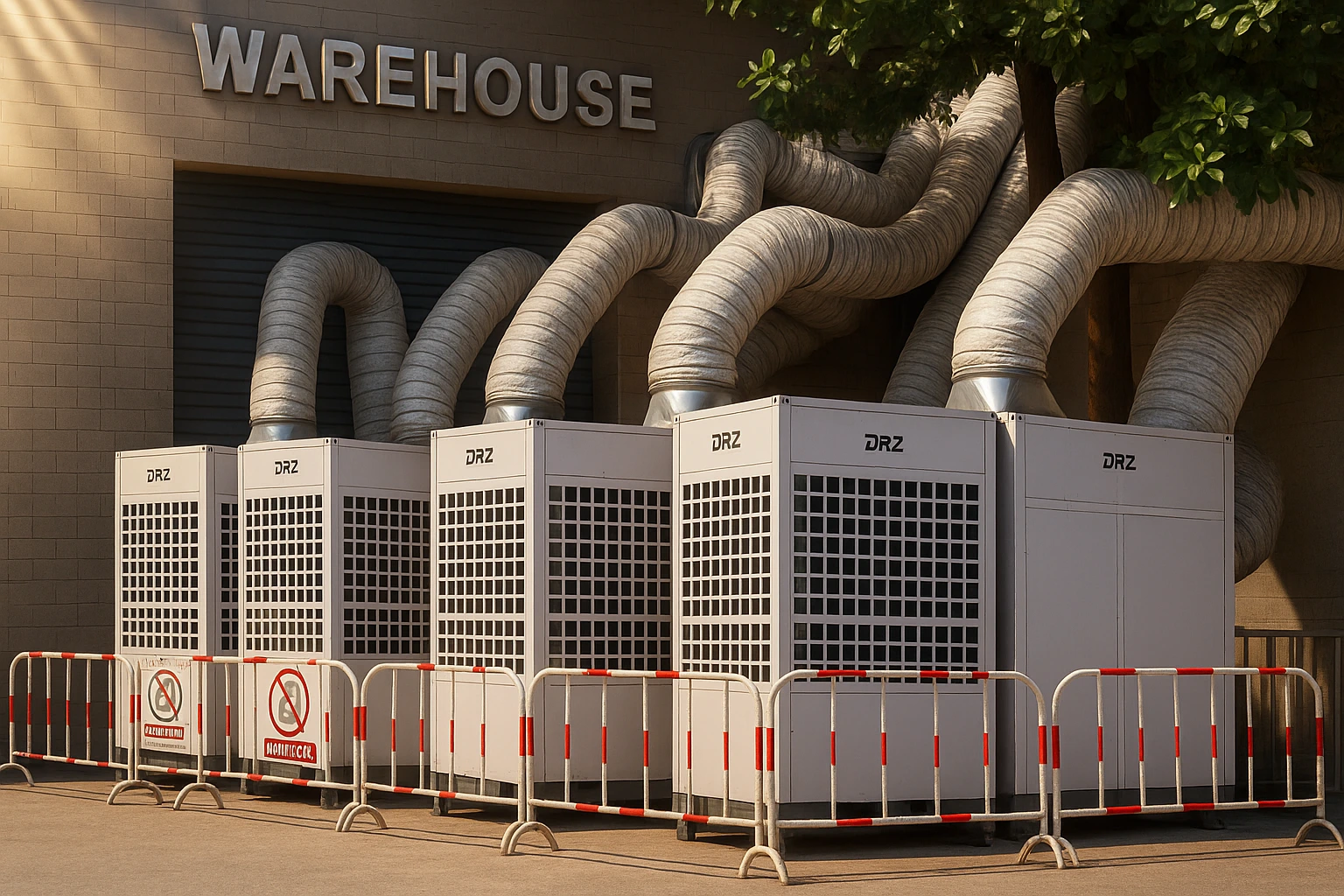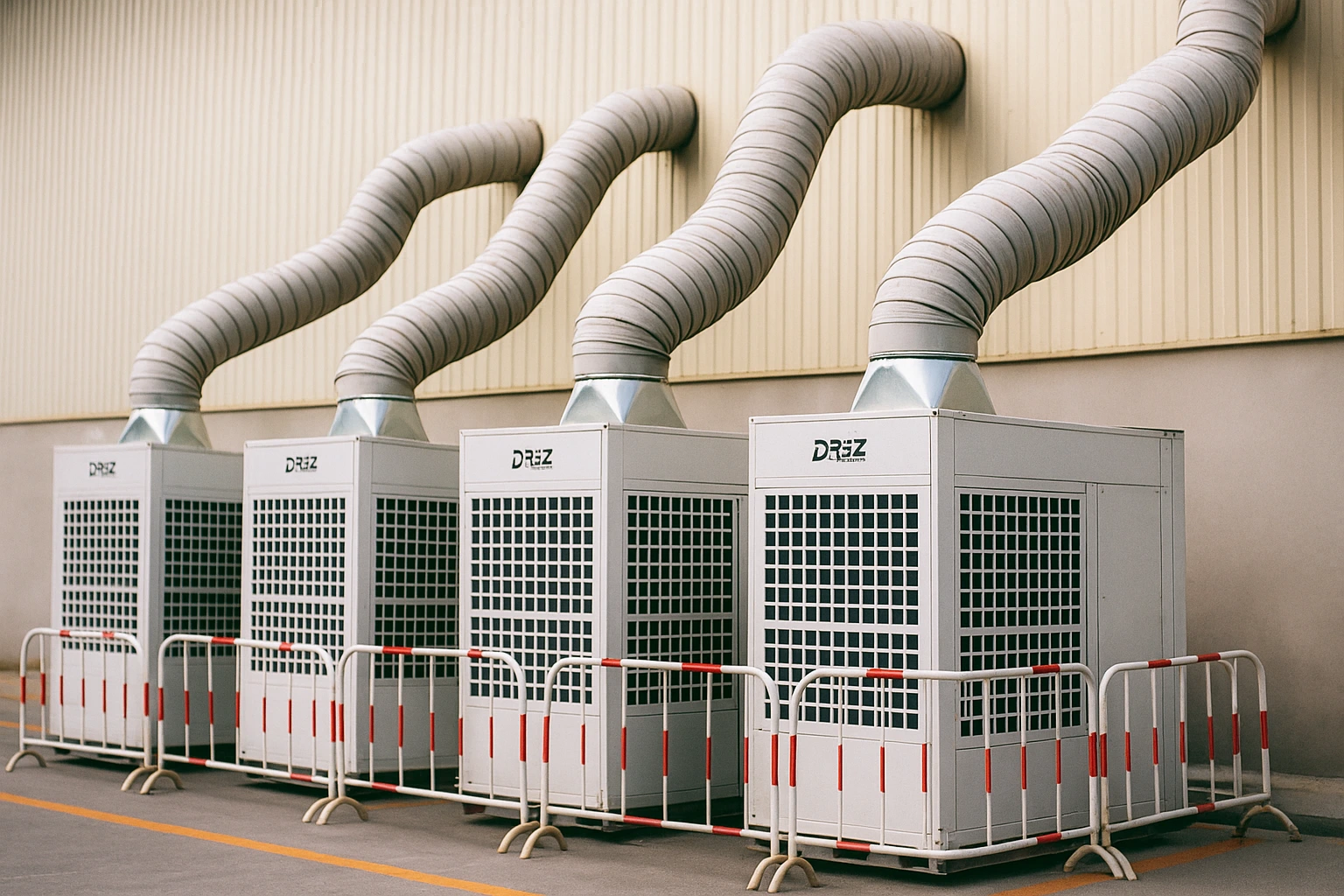Industrial air conditioner for warehouse spaces plays a crucial role in maintaining optimal temperature, controlling humidity, and ensuring a safe and efficient working environment. Warehouses often store temperature-sensitive goods, operate heavy machinery, or house large teams of workers, making proper climate control essential for productivity, inventory protection, and operational efficiency.
Without the right cooling system, warehouses can experience hot spots, uneven airflow, and increased energy consumption, which can lead to damaged products, equipment malfunctions, and higher operational costs.
Selecting the correct industrial air conditioning system requires understanding the warehouse’s size, layout, heat load, and specific cooling needs. It also involves evaluating different types of AC units, including portable, rooftop, and high-capacity packaged systems, to determine which solution delivers consistent performance and energy efficiency.
Additionally, factors such as ventilation, airflow optimization, and integration with building management systems play a critical role in achieving maximum efficiency.
How to Choose an Industrial Air Conditioner for Your Warehouse: Maximize Efficiency
In this guide, we will explain how to choose an industrial air conditioner for your warehouse to ensure reliable cooling, energy efficiency, and optimal warehouse performance.
Maintaining the right climate in a warehouse is more than a comfort issue it’s critical for protecting inventory, optimizing worker productivity, and controlling operational costs. Selecting the right industrial air conditioner for your warehouse requires understanding cooling requirements, AC types, energy efficiency, and installation considerations. This guide will walk you through the process step by step, providing actionable insights for warehouse managers, facility owners, and industrial decision-makers
Warehouses are large spaces that often store temperature-sensitive goods, operate heavy machinery, or employ staff for extended periods. Inefficient cooling can lead to:
- Heat stress affecting worker productivity.
- Damage to temperature-sensitive products.
- Increased energy costs due to improper HVAC selection.
By choosing the right warehouse HVAC system, businesses can maintain consistent climate conditions, improve energy efficiency, and extend the life of both equipment and inventory. This guide explains how to select the best industrial air conditioner for warehouses, focusing on performance, energy efficiency, and operational reliability.

Understanding Warehouse Cooling Needs
Before selecting any system, it is essential to evaluate the specific cooling requirements of your warehouse. Key factors include:
1. Warehouse Size and Layout
- Ceiling height: High-bay warehouses require high-capacity AC units and optimized airflow systems to distribute cool air effectively.
- Floor area: Larger floor spaces demand units capable of cooling multiple zones.
- Obstructions: Machinery, shelving, or mezzanine levels can affect air circulation, requiring tailored airflow solutions.
2. Heat Load and Equipment
Warehouses with machinery, lighting, or processing equipment generate additional heat. Accurate heat load calculations help determine the required cooling capacity (tons or kW).
3. Worker Comfort and Productivity
Temperature and humidity levels directly influence warehouse productivity. According to industrial studies, worker efficiency can drop significantly in poorly ventilated or overheated environments. Implementing warehouse climate control ensures safety and compliance with workplace standards.
4. Role of Warehouse HVAC Systems
An effective HVAC system in a warehouse maintains:
- Temperature control.
- Humidity regulation.
- Air circulation and ventilation.
- Energy efficiency and cost management.
By assessing these factors, you can determine the type and capacity of industrial air conditioners suitable for your warehouse.
Types of Industrial Air Conditioners for Warehouses
Understanding the different industrial AC systems helps you choose a solution that meets both operational and budget requirements.
1. Portable Industrial AC Units
- Ideal for temporary or flexible cooling needs.
- Can be relocated across zones within the warehouse.
- Suitable for small to medium warehouses or zones requiring supplemental cooling.
- Examples: Spot coolers or portable high-capacity ACs.
2. Rooftop HVAC Units
- Permanent solution mounted on the roof.
- Efficient for large high-bay warehouses.
- Can handle higher airflow volumes and cover entire warehouse floors.
- Integrates well with BMS (Building Management System) for energy optimization.
3. High-Capacity Packaged AC Systems
- Suitable for very large warehouse spaces or industrial complexes.
- Combines cooling, dehumidification, and air filtration in a single unit.
- Ideal for warehouses with temperature-sensitive goods such as pharmaceuticals or electronics.
Comparison of Features
| Feature | Portable AC | Rooftop HVAC | Packaged AC System |
|---|---|---|---|
| Mobility | High | Low | Low |
| Coverage | Zone-based | Full floor | Full floor / high-capacity |
| Installation | Simple | Moderate | Complex |
| Cost | Low-medium | Medium-high | High |
| Energy Efficiency | Moderate | High | High |
| Maintenance | Easy | Moderate | Moderate |
Key Features to Consider
When evaluating AC units, focus on features that impact efficiency, performance, and long-term costs.
Cooling Capacity
- Measured in tons or kW.
- Must match the warehouse’s heat load to prevent overworking the system.
- Over-sized units can waste energy, while under-sized units may fail to maintain temperature.
Energy Efficiency
- Look for high-efficiency industrial AC units with low power consumption.
- Consider energy-saving HVAC solutions like variable-speed compressors, inverter technology, and smart controls.
- Reduces operating costs while maintaining consistent cooling.
Warehouse Ventilation and Airflow Optimization
- Proper airflow ensures even temperature distribution.
- High-bay fans or HVLS (high-volume low-speed) fans can complement AC systems for efficiency.
- Optimized ventilation reduces hot spots and prevents condensation issues.
Dehumidification Capabilities
- Humidity control is critical for certain goods.
- Units with built-in dehumidification prevent mold, corrosion, and spoilage.
- Ideal for food storage, pharmaceuticals, and electronics warehouses.
Smart Controls and BMS Integration
- IoT-enabled controls allow remote monitoring and automatic adjustment.
- Integration with Building Management Systems helps reduce energy consumption and monitor performance.
5. Benefits of Industrial Air Conditioners in Warehouses
Investing in a proper industrial AC system delivers tangible operational benefits:
1. Consistent Temperature and Humidity Control
- Protects goods from heat damage or moisture.
- Reduces inventory losses and compliance issues.
2. Enhanced Worker Productivity and Comfort
- Studies show productivity drops in hot, humid environments.
- Consistent climate improves employee morale and reduces absenteeism.
3. Equipment Protection
- Machinery and electronics operate optimally within specific temperature ranges.
- AC systems prevent overheating and prolong equipment life.
4. Cost Savings and Energy Efficiency
- Efficient systems reduce energy bills.
- Prevents downtime caused by equipment or inventory failures.

Installation and Maintenance Tips
Proper installation and maintenance are crucial for efficiency and longevity.
Installation Considerations
- Decide between temporary (portable) or permanent (rooftop/packaged) solutions.
- Ensure adequate power supply for high-capacity units.
- Work with professional industrial AC providers for design and implementation.
Maintenance Best Practices
- Schedule routine inspections for filters, compressors, and airflow systems.
- Clean coils and vents to maintain efficiency.
- Monitor performance metrics using smart controls or BMS systems.
Troubleshooting Common Issues
- Uneven cooling → check airflow and unit placement.
- High energy consumption → inspect insulation, refrigerant levels, and load capacity.
- Noise issues → consider vibration dampeners or proper fan selection.
7. Case Studies / Success Stories
Case Study 1: High-Capacity Warehouse Cooling
- Challenge: A 25,000 sq. ft. warehouse storing temperature-sensitive electronics.
- Solution: Installed a high-capacity packaged industrial AC system with dehumidification.
- Result: Maintained temperature within ±2°C, reduced energy costs by 15%, and prevented product spoilage.
Case Study 2: Flexible Cooling with Portable AC
- Challenge: Temporary storage warehouse with fluctuating heat loads.
- Solution: Deployed portable industrial AC units across zones with high heat exposure.
- Result: Quick installation, effective zone-based cooling, minimal energy wastage.
Frequently Asked Questions (FAQs)
- What is an industrial air conditioner for a warehouse?
An industrial air conditioner for a warehouse is a high-capacity cooling system designed to regulate temperature, control humidity, and maintain airflow in large industrial spaces. - Why is warehouse climate control important?
Proper warehouse climate control protects inventory, ensures worker comfort, reduces equipment wear, and improves energy efficiency. - How do I determine the right AC capacity for my warehouse?
AC capacity depends on warehouse size, ceiling height, heat load from machinery, lighting, and occupancy. A professional HVAC assessment is recommended. - What types of industrial AC units are available for warehouses?
Common types include portable industrial AC units, rooftop HVAC systems, and high-capacity packaged AC systems for large spaces. - Can portable AC units be effective for large warehouses?
Yes, portable AC units are ideal for temporary or zone-specific cooling but may not be sufficient for full-floor high-bay warehouses. - How can I improve energy efficiency in warehouse AC systems?
Use high-efficiency units, optimize airflow with HVLS fans, integrate smart controls or BMS, and perform regular maintenance. - What role does dehumidification play in warehouse cooling?
Dehumidification prevents mold, corrosion, and product spoilage, ensuring inventory is stored under ideal conditions. - Should I install a permanent or temporary AC solution?
Permanent solutions like rooftop or packaged AC are best for continuous cooling. Temporary or portable units work for short-term needs or flexible layouts. - How often should I maintain an industrial AC unit in a warehouse?
Routine inspections and maintenance are recommended every 3–6 months, including filter cleaning, refrigerant checks, and airflow assessments. - Can industrial air conditioners improve worker productivity?
Yes, maintaining comfortable temperature and humidity levels enhances worker efficiency, reduces fatigue, and creates a safer working environment.
Conclusion
Selecting the right industrial air conditioner for your warehouse is a critical operational decision. By understanding:
- Your warehouse’s cooling needs,
- The different types of industrial AC units,
- Key efficiency and performance features,
- Proper installation and maintenance practices,
You can maximize efficiency, protect your inventory, and ensure a comfortable working environment.
For warehouses of any size, partnering with a trusted industrial AC provider like Drez Aircon ensures expert guidance, high-quality installation, and reliable ongoing support.
Contact Drez Aircon today to get a tailored industrial air conditioning solution for your warehouse.




